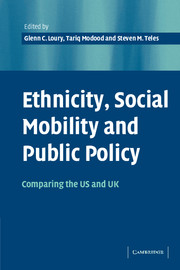Book contents
- Frontmatter
- Contents
- List of figures
- List of tables
- List of contributors
- Acknowledgements
- Introduction
- Part I Historical overviews
- Part II Informal social networks
- Part III Formal structures
- Part IV Political institutions and processes
- 16 Ethnicity and political mobilization in Britain
- 17 Political institutions and minority mobility in the USA
- 18 Race, state, and policy: the development of employment discrimination policy in the USA and Britain
- 19 Regime effects: ethnicity, social mobility, and public policy in the USA and Britain
- Part V Normative analysis
- Author index
- Subject index
- References
17 - Political institutions and minority mobility in the USA
Published online by Cambridge University Press: 22 September 2009
- Frontmatter
- Contents
- List of figures
- List of tables
- List of contributors
- Acknowledgements
- Introduction
- Part I Historical overviews
- Part II Informal social networks
- Part III Formal structures
- Part IV Political institutions and processes
- 16 Ethnicity and political mobilization in Britain
- 17 Political institutions and minority mobility in the USA
- 18 Race, state, and policy: the development of employment discrimination policy in the USA and Britain
- 19 Regime effects: ethnicity, social mobility, and public policy in the USA and Britain
- Part V Normative analysis
- Author index
- Subject index
- References
Summary
In comparing the influence of different political institutions on minority mobility, the conventional approach is to look at social and economic outcomes. This essay will go further and scrutinize the standards by which such outcomes are evaluated. What levels, rates, and disparities of mobility are acceptable, or not, to minority groups and other political actors? The standards used to answer these questions are typically treated as exogenous to the political institutions being studied. These standards are the product of many societal forces, to be sure. But they are fundamentally shaped by politics. Indeed, as conceptions of distributive justice, such standards are themselves political outcomes and are arguably more important than social and economic outcomes.
In the US context, such discussions inevitably address the impact of political machines on the mobility of ethnic and racial groups. Machines are usually compared with trade unions, social democratic or labor parties, and Progressive reforms. Here, too, this essay will go further and compare machines with the post-civil-rights regime that has effectively replaced them. I call this regime “post-civil-rights” because it grew out of the civil rights movement of the 1960s and, like all successful movements, has become institutionalized. My intention is to show the advantages and disadvantages of each, for minorities as well as for the larger society. Again, the focus here will be on how each regime has shaped expectations of minority mobility.
- Type
- Chapter
- Information
- Ethnicity, Social Mobility, and Public PolicyComparing the USA and UK, pp. 475 - 497Publisher: Cambridge University PressPrint publication year: 2005
References
- 1
- Cited by



